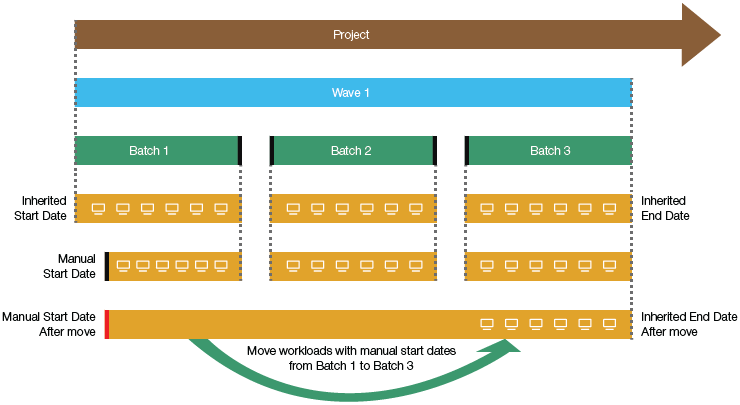11.5 Scheduling Dates
Project dates can be set according to your business and network needs. Business factors include your project priorities and the availability of resources. Network environmental factors include available bandwidth, connection speeds, and the amount of data being transformed.
You might have a specific cutover date in mind, or simply want to create a plan to get the work accomplished as efficiently and quickly as you can. External events might determine when certain tasks must be completed. IT and human resources availability also constrain your schedule.
Dates for waves and batches can be set manually or inherited from their parent objects. Dates of child objects must fall within the execution window of its parent object.
Figure 11-4 demonstrates how the dates flow down from parent to child. Manually set dates appear in a black font in fields and tables. Inherited dates appear in a gray font in fields and tables.
If you set dates manually, the date setting overrides inheritance rules. If you move a workload with a manual date from one batch to another, the manual date setting does not change, but the inherited date setting changes automatically.
Figure 11-4 shows how the manual date remains the same after you move the workloads from Batch 1 to Batch 3. If the manual date falls outside the execution window for the new batch, the date appears in a red font in fields and tables. You must re-configure the dates for workloads if their execution windows extend outside their new parent window.
Figure 11-4 Inherited Start Date and End Date

NOTE:Dates display in the format of your computer browser's Locale setting.
PlateSpin Transformation Manager displays an object’s dates in the following font colors, depending on how the object obtained the setting:
|
Font Color for Dates |
Condition |
|---|---|
|
Gray |
The date is inherited from its parent object. |
|
Black |
The date has been set directly on the object. The new date is automatically inherited by child objects. |
|
Red |
The date does occurs before or after the execution window set on the parent object:
|